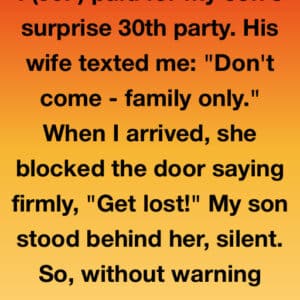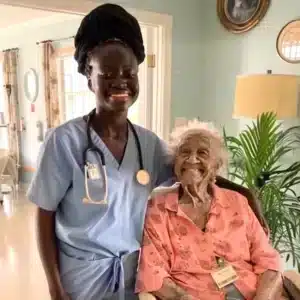Grief pushed me into the kitchen long before I understood why. I didn’t set out to become “the girl who baked pies for strangers.” I was just trying to keep my hands busy so my heart wouldn’t split open.
The night everything changed was one of those ice-bitten January nights when the windows weep from the cold. I was sixteen, curled up in bed with earbuds in, pretending homework mattered while my parents laughed at something dumb on TV. Then the smell of smoke cut through my music—sharp, metallic, wrong. The alarm screamed. My dad burst into my room, didn’t say a word, just hauled me by the arm, down the stairs, out into snow that burned my bare feet. He turned back for my mom and my grandpa. None of them came out again.
They said it was an electrical issue in the kitchen. The fire didn’t just take my family. It swallowed everything—photos, savings, the little ceramic horse my mom gave me when I turned ten. I was the only thing left standing in the yard.
A youth shelter found me a dorm-style bed: two bathrooms per floor, a shared kitchen for about twenty of us, quiet hours posted on the wall in faded marker. Warm, safe, clean. My aunt Denise—my mother’s older sister and my only relative—called once to say she had “no room” for me, that my uncle used the spare room as an office and she was “grieving too.” She was alert enough, though, to take half the insurance payout “to help with clothes and therapy.” She bought a wine fridge, a new car, a stack of romance and detective novels, and started showing up to book club in designer hats she called her “grieving wardrobe.” I didn’t fight her. I didn’t fight anything. Numb can look a lot like compliance.
By day I studied like oxygen lived between the lines of my textbooks—scholarships or bust. By night, when everyone else crowded around phones and sitcoms in the common room, I slipped into the kitchen. I learned the weight of flour by feel, the way butter breathes when it’s ready, how a wine bottle can stand in for a rolling pin if you scrub it enough. Blueberry, apple, cherry, peach, strawberry-rhubarb—whatever I could afford from my stipend and coupons. Sometimes I made ten pies. One night I made twenty.
I boxed them, taped them shut, and walked them through the dark to the homeless shelter downtown and the hospice center a few blocks away. I handed them to a nurse or a volunteer, never left a name, never waited to see who ate them. It was easier to love like that—quietly, without needing anything back. Aunt Denise called to scold me anyway. “You’re wasting money,” she said. “Those people don’t even know who you are. That money should be going to me. I lost my sister too.” She sounded inconvenienced, not broken. I put down the phone and kept kneading.
Two weeks after my eighteenth birthday, the receptionist called my name and set a cardboard box on the desk. My name was inked in delicate cursive on top; no return address. Inside was a pecan pie—perfect braided edge, golden, a breath of powdered sugar like first snow. When I cut into it with the dull knife from the drawer, the blade hit something. A small plastic sleeve. Inside, a cream-colored note, ink smudged at the corners:
“To the young woman with the kind heart and golden hands,
Your pies made my final months feel warm and full of love.
I never saw your face, but I felt your soul.
I don’t have family left.
But I’d like to leave my home and my blessings to someone who knows what love tastes like.
— M”
My knees went out. I slid to the floor and stared at the crust while my pulse thudded behind my eyes. The receptionist knelt beside me and rubbed my shoulder like you would to wake a bee-stung child. “Take a nap,” she whispered. “Some things are easier after.”
Three days later a lawyer named Paul called. Calm voice, careful words. He asked me to confirm my name and whether I’d been delivering pies to the hospice for nearly six months. “Yes,” I managed. “Then you may want to sit down,” he said. “Margaret Hendley passed away last week. She named you the sole beneficiary of her estate.”
I laughed—this sharp, startled sound that didn’t belong to me. “What estate?” He listed it like a grocery order: her house, her car, her personal belongings, and a trust her late husband left that she never used. “It accrued interest for nearly twenty years,” he said softly. “It’s valued at 5.3 million.”
“She didn’t even know who I was,” I whispered.
“She did,” he said. “A night nurse recognized your red coat with the missing button and followed at a distance one evening to make sure you got home safe. She saw you go into the shelter and asked the receptionist your name. Margaret went blind near the end, but she made the staff describe every pie—how it looked, how it smelled. She kept a journal and saved slices to share. Once she said, ‘Whoever she is, she’s young and grieving. But she still knows how to love.’ She asked us to find you quietly.”
I sat on a bus-stop bench with scholarship forms fanned in my lap like fallen leaves and watched a sky that looked too big for what was happening to me. I didn’t tell anyone. I was afraid the truth would vanish if I carried it too soon. It didn’t take long for Aunt Denise to find out anyway—probate notices in the newspaper are free reading for people who love the obituaries. She called to say I “owed” her, that she “raised” me, that “family” should get the house and the money. I hung up. Then I blocked her number.
Margaret’s house sits on a quiet street where porches still talk to each other. Inside smells like cedar and old books. There’s a greenhouse out back my breath fogged the first time I stepped inside—roses and orchids everywhere, a little sign that says her husband built it for their thirtieth anniversary. I moved in last month. I haven’t touched the money yet. It’s not going anywhere.
I bake in her kitchen now. I use her wooden spoons and the heavy rolling pin that turns dough into silk. There’s a note above the oven in her handwriting: “The best ingredient is time.” I still carry pies to the hospice and the shelter, and now to the hospital too. I leave a small card on each box: “Baked with love. From someone who’s been where you are.”
Sometimes I think about the last pie I made for Margaret that she never saw, only smelled—the sugar crackle, the butter bloom, the cinnamon sigh. Sometimes I think about my father’s hand around my wrist pulling me into the snow. Sometimes I think about how grief tries to convince you that love is over, when really it’s just changing form.
A stranger’s pie arrived on my doorstep and rewired the story I was telling myself about what was left. It wasn’t the money or the deeds that changed me, though. It was the proof that love I’d poured out in the dark was somehow finding its way back, warm and whole, without needing my name. In a life that burned down to almost nothing, that felt like the first true peace I’d had in years.





